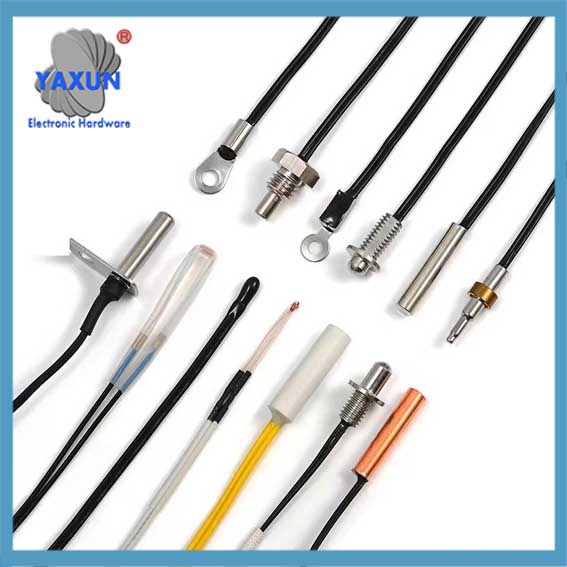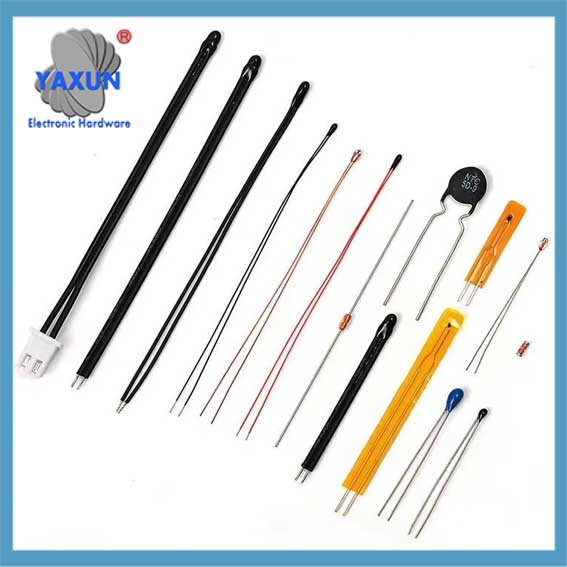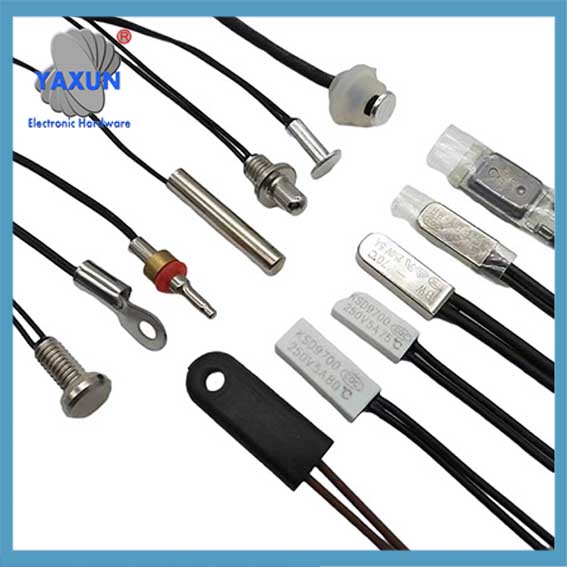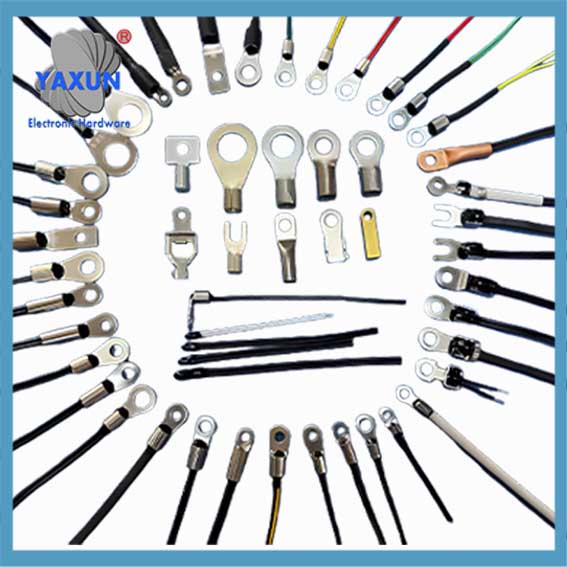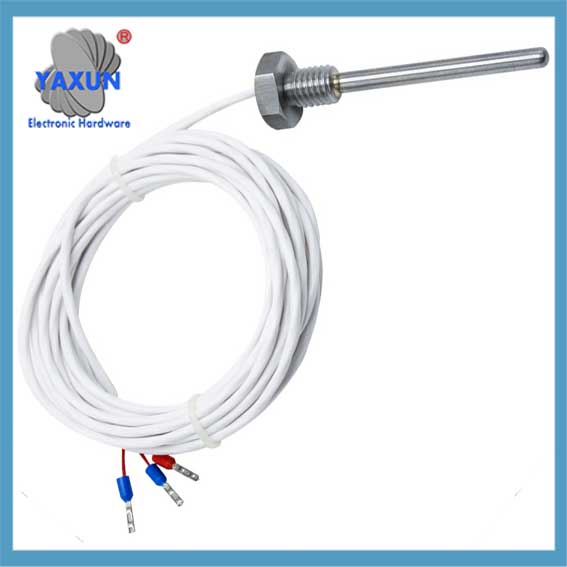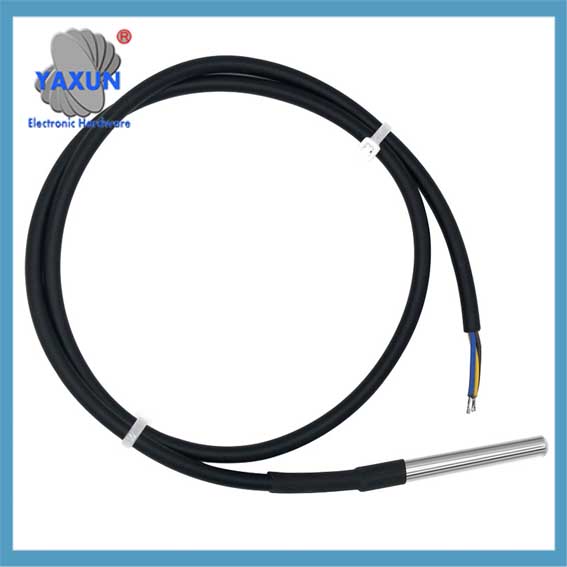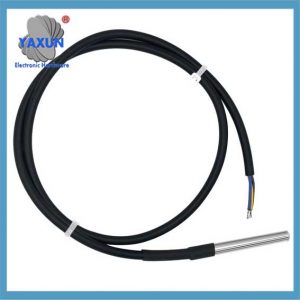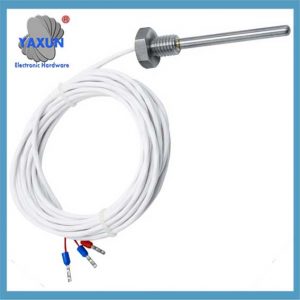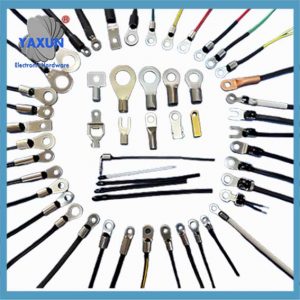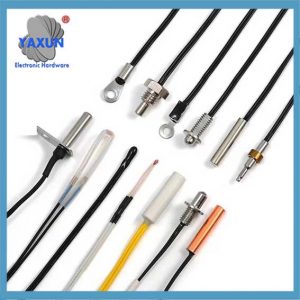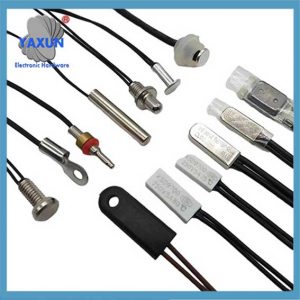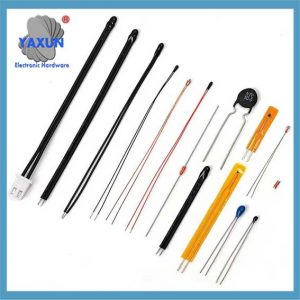Categorias de Produtos
- Disjuntor térmico 20
- Porta-caixa de fusíveis 36
- Sensor de temperatura 67
- Interruptor térmico 64
- Fusível do carro 19
- Fusíveis aparafusados 7
- fusível térmico 32
- fusíveis de montagem em superfície 12
- termistor 22
- Suporte de fusível para montagem em PCB 27
- Chicote de fiação 6
- Porta-fusíveis de lâmina 17
- termostato 46
- Fusível elétrico 14
Etiquetas de produto
Postagens recentes
Sondas de temperatura, Tipos de sensores de temperatura & aplicações
Uma sonda de temperatura é um dispositivo usado para medir a temperatura, geralmente consistindo em um elemento sensível e um circuito de medição. O elemento sensível pode ser um termopar (pt100, pt1000), um resistor térmico (ntc, ptc), um semicondutor (DS18B20 digital), etc., que pode converter mudanças de temperatura em sinais elétricos. Então é amplificado, filtrado, convertido, e processado pelo circuito de medição, e finalmente um sinal elétrico proporcional à temperatura é emitido.
Temperature probes and temperature sensors are two different devices, and they have their own characteristics and application scenarios in measuring temperature.
Temperature Probe
UM “temperature probe” is a sensor used to measure temperature by converting the heat energy into a measurable electrical signal, and the most common types of temperature sensors within a probe include thermocouples, Resistance Temperature Detectors (IDT), and thermistors, each with distinct characteristics and applications based on the required accuracy, faixa de temperatura, and response time needed for a specific situation.
Definition: Uma sonda de temperatura é um dispositivo usado para medir a temperatura, geralmente consistindo em um elemento sensível e um circuito de medição. O elemento sensível pode ser um termopar (pt100, pt1000), um resistor térmico (ntc, ptc), um semicondutor (DS18B20 digital), etc., que pode converter mudanças de temperatura em sinais elétricos. Então é amplificado, filtrado, convertido, e processado pelo circuito de medição, e finalmente um sinal elétrico proporcional à temperatura é emitido.
Working Principle: The working principle of the temperature probe is to use the response of the sensitive element to temperature changes to convert temperature changes into electrical signals. Common sensitive elements include thermocouples, Resistores térmicos, semicondutores, etc.. The working principle of the thermocouple is to use the thermoelectric effect of two different metals or alloys. When they are connected together and at different temperatures, an electromotive force proportional to the temperature is generated. The working principle of the thermal resistor is to use the property that the resistance of metal or semiconductor materials changes with temperature. When the temperature changes, the resistance value will also change accordingly. The working principle of semiconductor is to use the property that the conductivity of semiconductor material changes with temperature. When the temperature changes, the conductivity will also change accordingly.
Type: The types of temperature probes mainly include thermocouple probes, thermal resistor probes, semiconductor probes, etc.. Thermocouple probes use thermocouples as sensitive elements, and have the characteristics of wide measurement range, fast response speed, and high precision. Thermal resistor probes use thermal resistors as sensitive elements, and have the characteristics of high measurement accuracy, boa estabilidade, and strong anti-interference ability. Semiconductor probes use semiconductors as sensitive elements, and have the characteristics of small size, peso leve, and low power consumption.
Application fields: Temperature probes are widely used in industry, scientific research, medical care, environmental protection and other fields. Such as temperature measurement and control in chemical, petroleum, metallurgy, electricity, pharmaceutical, food and other industries.
DS18B20 Temperature Sensor Cable with Probe
Wiring: Red(VCC), Yellow(Data), Preto(Gnd)
Wide temperature range of -55 ℃ ~ +125 ℃
Fonte de energia: 3.0V ~ 5.5V
Tips: Using a 4.7K resistor between the Data and VCC will make the testing of the probe easilier.
Termopar:
Função: Generates a voltage difference based on the temperature at the junction of two dissimilar metal wires.
Pros: Wide temperature range (-200°C to 1750°C), relatively inexpensive, fast response time.
Cons: Lower accuracy compared to other sensors, requires calibration tables to convert voltage to temperature.
Aplicativos: High-temperature applications like furnaces, engine monitoring, industrial processes.
Thermistor:
Applications of Temperature Probes:
Industrial Processes: Monitoring temperature in manufacturing processes like ovens, reactors, and extruders.
HVAC Systems: Regulating room temperature in buildings by monitoring air temperature.
Food Safety: Monitoring food temperature during cooking and storage to ensure food safety.
Medical Devices: Measuring body temperature in patients through probes inserted into the body.
Automotive Industry: Monitoring engine coolant temperature and cabin temperature.
Scientific Research: Precise temperature measurements in experiments.
Sensor de temperatura
Definition: A temperature sensor is a device that can convert temperature changes into electrical signals. It usually consists of a sensitive element and a signal processing circuit. O elemento sensível pode ser um termopar, Resistor térmico, semiconductor, etc.. The signal processing circuit can be an analog circuit, a digital circuit, etc., which together complete the acquisition, processamento e saída de sinais de temperatura.
Working principle: The working principle of the temperature sensor is similar to that of the temperature probe. It also uses the response of the sensitive element to the temperature change to convert the temperature change into an electrical signal. No entanto, the temperature sensor usually has a more complex signal processing circuit, which can perform more advanced processing on the temperature signal, such as digital conversion, data storage, communication, etc..
Type: The types of temperature sensors mainly include analog temperature sensors, digital temperature sensors, and intelligent temperature sensors. Analog temperature sensors output analog signals, which need to be converted into digital signals through analog-to-digital converters. Digital temperature sensors directly output digital signals, and have the characteristics of strong anti-interference ability, alta precisão, and easy integration. Intelligent temperature sensors have functions such as self-diagnosis, Autocalibração, and communication, e pode realizar monitoramento e controle remotos.
Features: The temperature sensor has the characteristics of high measurement accuracy, boa estabilidade, forte capacidade anti-interferência, and easy integration. Different types of temperature sensors have different characteristics, such as analog temperature sensors require analog-to-digital converters, digital temperature sensors directly output digital signals, and intelligent temperature sensors have functions such as self-diagnosis, Autocalibração, and communication.
Application fields: Temperature sensors are widely used in smart home, smart wearable, medical equipment, industrial automation, Monitoramento ambiental e outros campos, such as air conditioners, geladeiras, máquinas de lavar, thermometers, sphygmomanometers, industrial control systems, etc..
How to choose?
When choosing a temperature probe or temperature sensor, the following factors need to be considered:
Application environment: Considere se o ambiente medido tem condições especiais, como corrosividade, alta temperatura, alta pressão, etc., de modo a selecionar materiais adequados e níveis de proteção.
Measurement range: Selecione um sensor adequado de acordo com o alcance da temperatura a ser medido para garantir que o sensor possa medir com precisão dentro do intervalo necessário.
Accuracy requirements: Select a sensor with corresponding accuracy according to the accuracy requirements of the application for temperature measurement.
Cost budget: Select a cost-effective sensor according to budget constraints.
How to use?
When using a temperature probe or temperature sensor, the following matters need to be noted:
instalação: Install it correctly according to the installation instructions of the sensor to ensure that the sensor is in good contact with the object to be measured and avoid measurement errors caused by improper installation.
Estando: Conecte corretamente a linha de sinal e a linha de energia do sensor para garantir a estabilidade e a precisão da transmissão de sinal.
Calibration: Calibre o sensor regularmente para garantir que sua precisão de medição atenda aos requisitos de aplicativo.
manutenção: Limpe e mantenha o sensor regularmente para evitar poeira, sujeira, etc.. affecting the measurement performance of the sensor.
Temperature probe sensor is one of the important products of our YXAUN company. We focus on the fields of intelligent manufacturing and industrial automation, and provide a series of high-precision and stable measurement and control equipment, including temperature probe sensors. Our temperature probe sensors are widely used in industrial manufacturing, Monitoramento ambiental, energy management and other industries with their high precision, stability and adaptability to complex environments. If you have specific needs or questions about our temperature probe sensors, please feel free to consult us. We will wholeheartedly provide you with professional answers and services. What aspect of the temperature probe sensor do you want to know?
How to choose a suitable temperature probe sensor?
When choosing a temperature probe sensor, consider the temperature measurement range, requisitos de precisão, response speed and installation environment. Por exemplo, thermocouples or platinum resistance can be selected for industrial environments, PT100 for high precision, and thermocouples for fast response.
Contate-nos
Aguardando seu e-mail, responderemos dentro de 12 horas com informações valiosas que você precisava.
 English
English العربية
العربية Български
Български 粤语
粤语 中文(简体)
中文(简体) 中文(漢字)
中文(漢字) Nederlands
Nederlands Suomi
Suomi Français
Français Deutsch
Deutsch Ελληνικά
Ελληνικά Magyar
Magyar Italiano
Italiano 日本語
日本語 한국어
한국어 Polski
Polski Português
Português Română
Română Русский
Русский Slovenščina
Slovenščina Español
Español Svenska
Svenska ภาษาไทย
ภาษาไทย Türkçe
Türkçe Tiếng Việt
Tiếng Việt
